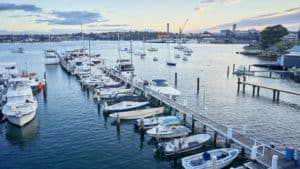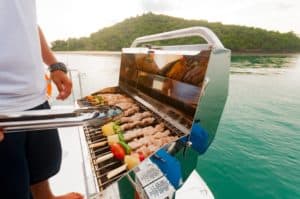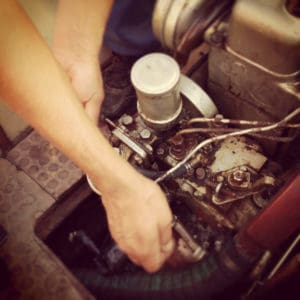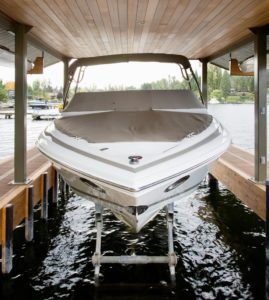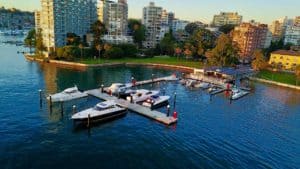There’s plenty to consider before taking your yacht or sailboat out on to the open ocean, whether for a few weeks or months. During longer trips, your boat takes on a different role – and if you’re used to short trips, you may overlook some of the things that become more important once you’re off for longer durations.
Here’s some things you should know before setting off to sea for longer distances to keep yourself safe, comfortable, and prepared for your adventure.
Preparing for a Life at Sea
With a basic list of essentials you should have on your boat every time you set sail, for extended sailing trips you’ll have a few more fundamental changes to make.
Prior to leaving, ensure you’ve gathered all the necessary paperwork to operate your boat. This includes registration papers, insurance, VHF operator’s certificate, and photo ID for everyone onboard. To avoid any disappointments in the future, filing paperwork ahead of your takeoff date, and researching any applicable visa requirements for extended stays elsewhere should also be a part of your plan. Let your credit card companies know you’ll be traveling, and make sure to pick up any forieng currencies ahead of time when getting your finances in order prior to leaving.
1. Safety
Before even adding anything to your boat for your long haul, make sure to set up a communications plan with your friends or family back at home, giving a travel itinerary so everyone can have an idea of your whereabouts throughout your journey. Cell phone fees can be a steep expense when out at sea, so planning ahead with a new data plan can spare you extensive charges.
Also, keep in mind that relying on a cellphone alone may not be an option for long distance cruising. Having a working VHF radio onboard and knowing how to use it is crucial for weather updates, making or responding to mayday calls, and communicating with other boats.
Other safety items for your boat include:
- Life rafts
- Life jackets
- First Aid kit
- Fire extinguishers
- Anchors for seabeds
- Handheld GPS
- Antennas and range extenders
- Satellite phone
- Flashlight or outdoor lighting
- Flares
- Blankets
- Fuel cans
There are different kinds of safety equipment required for your boat depending on it’s length, the local legislations, the distances you’re traveling, and type of water you’ll be sailing on, so planning ahead and making sure you’re complying with the law as well as keeping yourself prepared in case of emergencies can be life saving and offer peace of mind.
2. Maintenance
Learning the mechanics of your boat on land will be very helpful if you run into any problems out on the ocean. You’ll want to make sure you can troubleshoot or repair your own mechanical systems all by yourself. Tinker with your boat before your trip, watch Youtube videos, take classes, and gain as much knowledge about troubleshooting and fixing your boat’s systems as you can. Talking to someone in your marina for extended distance boating tips can also be extremely helpful to give you a rundown of your boat and what they think you might need for your future trip on your boat, specifically.
Important Checks and Maintenance Before You Leave
- Ground tackle
- Sails
- Rigging
- Electric systems
- Propellers
- Engine
- Hull
- Cleaning exhaust manifolds
- Handrails
- Trip hazards
- Lights in working order
- Conversion to saltwater use if necessary
- Toolkit for minor repairs
- Oil drainer
- Extra sails
3. Comfort
Whether it’s comfort for making your trip easier, or for the events of downtime while sailing between ports, you and your passengers will be a lot happier onboard planning ahead for entertainment and certain objects of convenience.
Consider these options to make your life at sea safer and more manageable:
- Watermakers are used to desalinate seawater. On average, you need about 4-6 gallons of water per person, and desalinators filter 1-8 gallons of water per hour. Getting a watermaker rather than lugging around a huge gallon tank helps a lot to reduce the weight on your boat, which improves your overall sailing performance.
- Generators are important when making longer trips, as you’ll need to be self reliant and produce your own power. There are four options for generators: traditional generators, solar panels, wind generators, or hydro generators.
- Cockpit canvases help keep the sun from beating down on you, hardtops are also available
- Refrigerators are especially important for ocean journeys where you can be self reliant for weeks at a time
- Mobmats to hang on the side of your boat in case of man overboard
- Autopilots make covering ground much easier, especially when traveling days on end
- Entertainment including books, board games, laptops, movies, music, etc.
- Toiletries and medications
- Provisions that have a long shelf life
Considerations for a Boating Lifestyle
There’s plenty to love about living at sea, but committing to a boating lifestyle isn’t for everyone. Boating can be not only physically challenging, but mentally as well, especially if you’ve never been away from home for so long.
When choosing the boating life, there are tradeoffs, and many factors to consider :
- Sea sickness (your passengers and yourself)
- Cooking or sleeping on a rocking boat
- Not having a schedule
- Family time back home
- Storms and rough oceans
- Giving up conveniences like trips to the store or mall
- Physical tolls of boat maintenance
Thankfully there’s a lot of luxuries and comforts that have made long distance sailing a lot more comfortable. Also, with ports and marinas around the world ready for new adventurers to sail in, you’ll find yourself a new fulfilling experience wherever you put your anchors down.
Make Sure You’re Ready for Your Next Adventure
Corleone Marinas offers premium harbour experiences across Sydney, including locations in Sydney’s most prestigious sites including Elizabeth Bay, Long Island, Balmain and Drummoyne. Each site offers a variety of options including berths, moorings, on-site slipways and shipwrights.
If you need maintenance or repairs for your vessel, we can help! Contact us today to learn about our full range of marina services.


